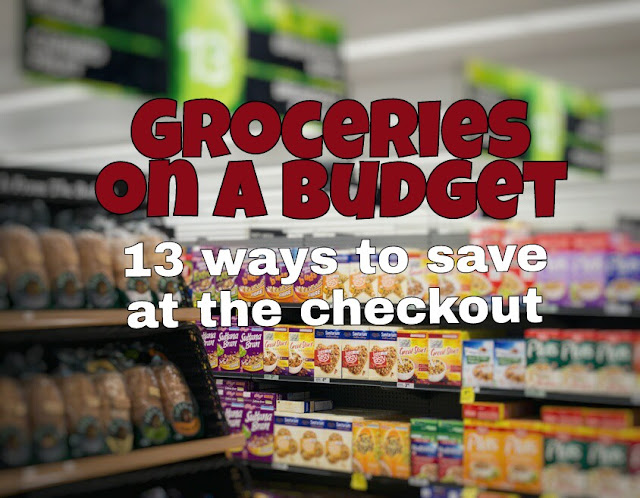Grocery Shopping on a Budget
I've written about grocery budgets before and how much they vary from household to household.
Larger budgets are obviously much easier to refine while tighter budgets require a lot more thought and planning in order to find savings and maintain a healthy balanced diet for your family.
Time is money. Spending a little more time preparing for your shopping trips will save you money. Here's a few helpful tips to get you started on grocery savings.
Make Lists
Make a note of what you already have, what you need and what you are low on.
Consider what you may be able to make from scratch rather than buying complete prepackaged meals or snacks.
Starting with basic necessities and working your way down to things you could do without or marking the items that are not essential, create a shopping list and then reassess your non essential items.
Plan Ahead
Know exactly what you need and stick to your list. A well thought out list is invaluable if you are often ducking back to the shops for one or two items and usually leaving with three or four.
Checking the store specials before you go. Planning meals to suit these specials can mean huge savings too.
Eat Before You Go
When you are hungry, you are more likely to pick up unnecessary food purchases.
Make sure you eat before you go or take a snack you can eat while you are shopping. You'll stay more focused on a full stomach.
Pay With cash
For extreme spending control: Withdrawing your budgeted amount and leaving cards behind means there is no way you can overspend.
The downsides to this is that great opportunities to stock up on a real bargain can be missed and unless your list is well planned, you may find you are in need of a topup shop later in the week.
Buying in bulk
The price per unit feature is great for those of us who don't want to spend our whole shopping trip doing division.
Often, a smaller quantity item on special can still work out cheaper in the larger quantity not on special. Consider if you will use the larger/cheaper quantity before it's expiry date. It's only a saving if you are going to use it, otherwise it will cost more in the long run.
For example: My local supermarket occasionally has 10kg of rice on special for $10, full price is $18 and smaller quantities are $2 for 1kg. It might not seem like much of a saving on it's own but small amounts add up and the tighter your budget, the more valuable that dollar becomes.
Buying Items on Special or Sale
Again, the unit prices are very helpful here and you can't always rely on a saving just because something is on special. Larger bulk items may still work out cheaper so make sure you factor this in.
Always think carefully before buying something on special, do you need it, will you use it before the use by date, is it really a saving?
If your budget is left a little bit flexible, keeping an eye out for specials that you know will benefit you down the track is a good idea, even if you don't need it now. (I had 12 litres of cooking oil at one stage because the price was so low! Saving = approximately $40)
Shopping Around
Different stores will have different specials and sales at different times. Checking online catalogues will give you the best idea on where best to shop for your specific needs. If you have the time to travel to each store to nab these bargains be sure to consider whether travel costs are worth it.
Split the Bill
Some families join with other families. This is a great way to save money buying in bulk.
For example: You might choose to buy your fresh produce from the markets and each family shares the travel. Shopping at fresh food markets can be a lot cheaper but if you are travelling a long way to get there the cost of petrol could cancel out that saving.
Some stores specialise in bulk quantities at low prices, taking a friend along and splitting these purchases gives great long term benefit.
Shop Without the Kids
Easier said than done, I know but if you can get someone to look after the kids for just a few hours while you shop, your full attention will be on the task at hand.
Distraction, frustration and tantrums will result in unnecessary purchases or forgotten items which will result in another trip to the shop.
You could even relax with a coffee for a few minutes afterwards with the savings you'll make.
If you don't have family close by, think about whether you have any friends who may be in a similar situation. You could return the favour and give them a few hours alone too.
Shop Online
If you really can't shop without the kids, consider whether shopping online is an option for you. Remember to factor in delivery costs so you don't get caught off guard at the checkout.
Buy Direct From Local Producers
Buying direct from local suppliers and small businesses not only saves on hidden transport costs and taxes, it also has a huge impact on the big picture. If there was no competition from the little guy, large supermarket chains would hold all of the power, they would be free to raise their prices. Support local and small businesses and keep the balance of power.
Buy Seasonal Fresh Produce
Buy Seasonal Fresh Produce
Fresh produce can be expensive if it isn’t in season. Cater your meals to what is in season and if you need to use out of season produce, consider a cheaper alternative like frozen or tinned.
Cheaper Alternatives
Some ingredients can be easily traded for cheaper options with little to no difference. Try cheaper baking basics, sauces and canned goods and see if you can tell the difference.
Buying cheaper brands won't pay off if no one likes it. Testing your family on a smaller quantity first rather than going for the big 4kg bulk save super pack straight away will reduce waste should you find it is not a suitable alternative to your regular brand.



Nice Post!!
ReplyDeletePlease look here at Meal Plan